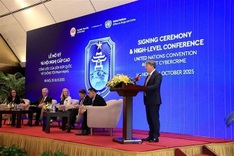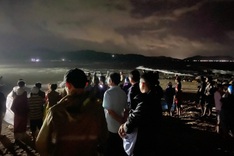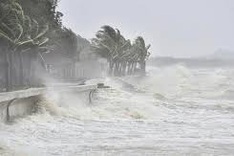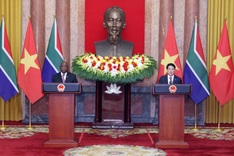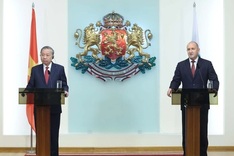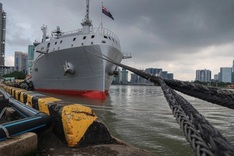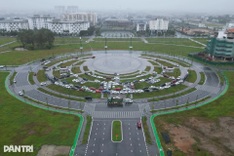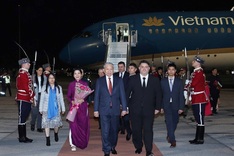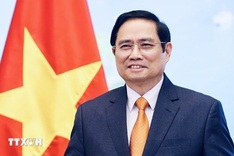In part 10 of the series, Laura Lam chronicles the final days for Ho Chi Minh in France, as surveillance and spies forced the revolutionary to flee and disappear into the night.
>>Part 1: Paris, my two worlds
>>Part 2: A journey in search of freedom
>>Part 3: Nguyen the Patriot
>>Part 4: Indochina and little emperors
>>Part 5: The rise of patriotism
>>Part 6: Finding a compass
>>Part 7: Young Ho Chi Minh with Grand Chef Escoffier
>>Part 8: Young Ho Chi Minh in America
>>Part 9: Ho Chi Minh versus Albert Sarraut
In late 1919 Nguyen Ai Quoc completed a manuscript titled “Les Opprimés”, a critique of French policies in Indochina. It was stolen by one of the spies who had searched his home while he was out. Finding no criminal activity, the Sûreté Générale reported to the Minister of the Interior on his daily routine: that Quoc was a regular visitor to the Bibliothèque Nationale and the Bibliothèque Sainte-Geneviève; he was fluent in several languages; and he often went to political meetings.
 |
| Gare du Nord, Paris, where Quoc and a railway employee secretly met. |
 |
| Gare de L’Est, Paris, where Quoc departed for Berlin. |
Quoc was invited to the French Socialist Party’s Congress held in Tours (near the Loire Valley) in December 1920. The conference was attended by 285 delegates and Quoc gave a speech on Indochina. The next day, the journal Le Matin published an article about the event, with a picture of Quoc speaking, wearing a black suit. The Sûreté Générale was alerted and immediately sent two policemen to arrest him. Trying to protect Quoc, several delegates gathered around him all the time. The police gave up.
In February 1921 Quoc became ill with an abscess on his right elbow and was hospitalized at Cochin Hospital in Paris for one month. One of the spies, who disguised himself in army uniform, visited Quoc at the hospital to extract information from him. But the patient knew it and voiced his opinion and frustration over the constant surveillance and harassment.
In late May 1921, Quoc participated in a public demonstration to commemorate the French deaths during the Paris Commune in 1871. This event took place annually at the Paris cemetery Père Lachaise and Quoc had been with the same group at previous demonstrations. But this time he was brutally beaten by the police for no apparent reason. His fellow demonstrators tried to shield him and he was able to escape.
At the congress in Tours, the French Socialist Party was renamed the French Communist Party (FCP). In December 1921, the FCP held its first conference in Marseille. Quoc was a founding member, and he was scheduled to speak at the conference. As soon as he arrived, two plain clothes policemen tried to seize him at the entrance. But Quoc eluded them and entered the conference room safely. The police stayed and began patrolling the hotel. Some congressmen decided to accompany him all the time. Quoc gave a speech, confirming his allegiance to socialism and his determination to free Viet Nam. He was elected as the FCP’s representative for one of the districts in the Seine Valley.
Aware of the continued presence of police, Paul Vaillant Couturier invited Quoc to share the hotel room with him that night. Early in the morning, another congressman, François Aussoleil, accompanied him to a secret location and waited until he could catch the train back to Paris.
As soon as he walked into the photo shop where he worked, Quoc found his employer in an angry mood. He informed Quoc that the police had come to the shop and caused a lot of trouble, and the authorities would invalidate his carte de séjour. Quoc was told his salary would be reduced from 120 francs to 80 francs per month, until he obtained a new residence permit. As pressure from the police was mounting, the owner of the photo shop soon dismissed him.
He started working from his apartment and advertised his service in the local press. It included touching up of photos, writing signs, decorating lamp shades, vases, fans… Since he was a founding and active member of the FCP, Quoc was given an allowance to supplement his income.
The harassment by the police was increasing. In the summer, Quoc wrote a public letter and had it printed in three journals: Le Paria, L’Humanite, and Le Journal du Peuple. In that letter he declared details of his daily activities. To ridicule Sarraut, he “thanked” the French authorities for providing him with three “aides-de-camp” (the three spies) at a time when the government was trying to save money and cutting down jobs.
In mid 1923, Quoc suddenly disappeared. The Minister of the Interior sent a letter to Albert Sarraut in late July, 1923, “He was supposed to be away for 10 days of holiday. But he hasn’t returned. That Annamite is the key person in the Communist movement in the Colony.” The spy agency searched for him through Haute-Savoie and the surrounding areas but there was no sign of Nguyen Ai Quoc.
The FCP had invited Quoc to their 5th congress in a suburb of Paris. It was to take place on June 13. The night before, he was able to meet and say goodbye to Max Bloncourt, a close friend who was also legal council for the journal Le Paria.
Quoc arrived at the FCP’s conference in the morning, dressed in a smart suit like a businessman. He left the conference early evening and headed for the cinema. He saw a silent movie, but went out before the movie ended, and took a bus to Gare du Nord.
An employee of Gare du Nord (a friend Quoc knew through the workers union) was already waiting for him at the station. He handed Quoc a new Chinese passport, a first class train ticket, and a small suitcase. Then he accompanied Quoc to Gare de L’Est, a ten minutes walk from Gare du Nord. As they walked, the friend confirmed that he had already arranged for somebody to meet Quoc in Berlin. Quoc tried very hard to suppress his emotions. At Gare de L’Est, they said goodbye and Quoc hurried to the night train.
After a few days in Hamburg, a member of the German Socialist Party arranged for Quoc to board the Karl Liebknecht for Russia. He arrived in Petrograd on June 30 as a businessman, with a tourist visa under the new name Chen Vang (Trần Vương in Vietnamese).

